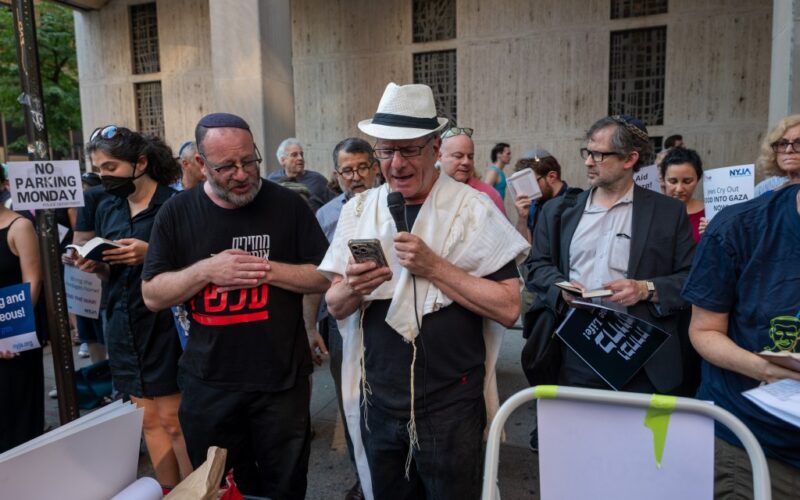This week, I joined 10 rabbinic colleagues in an act of civil disobedience outside the Israeli Consulate in New York City. Eight of us, including me, were arrested and briefly detained after disrupting traffic on Second Ave. This was not my first time being arrested at a protest, but it was my first time doing so to protest the actions of the Israeli government.
Taking action to speak out against the Israeli government was deeply painful and difficult. I desperately did not want to do this, but my understanding of Judaism and Zionism demanded I not be silent. With humility and grief, but also with resolve, I sat in the street holding two photos: one of Gali and Ziv Berman, cousins of a congregant who are still languishing in captivity, and the other of a starving child in Gaza.
For the better part of two years I have used every tool at my disposal to call for an immediate release of the hostages, a negotiated end to the fighting, and a surge of humanitarian relief for the innocent people of Gaza. In sermons from our bimah and in private conversations with congregants and colleagues, in the press and on podcasts, in open letters and closed-door meetings with policymakers, I have tried to make the case for this vision of the future and the concrete actions I believe would lead us in that direction.
This action organized by mainstream, liberal Zionist organizations New York Jewish Agenda, T’ruah and J Street — which saw a group of Zionist rabbis, including from prominent and established congregations, arrested in the street — was an unmistakable escalation.
Without doubt, Hamas bears responsibility for the starvation and deprivation of innocent Gazans — a moral stain on a terror organization with no shortage of them. Yet honesty, and our Jewish values, demand that we acknowledge this stain has clearly spread to the Israeli government’s actions as well.
More than two million Gazans are facing what has been called a “worst case scenario of famine” and an unprecedented collapse in access to food, clean water, medicine and essential services. The Israeli government is claiming to represent Judaism while violating its foundations and tarnishing its soul.
Tonight begins Tisha B’Av, on which we collectively mourn the destruction of our Jerusalem Temple and all of the terrible destruction our people have faced since. The essential teaching of this day is that calamity befalls us when we turn our backs on Torah. We are inheritors of a beautiful and sacred tradition. As a rabbi, my life’s work is to teach and share that tradition.
In this moment, it is that very tradition which compels us to speak up loudly and forcefully to demand an end to the violence being committed by those who claim to represent us. They do not.
Judaism calls upon us to feed the hungry and stand for the inherent dignity of every single human being. If we believe that all of us are created in God’s divine image — a lesson which comes from the very first chapter of Torah — we must ensure those words have meaning.
And nothing about what is happening in Gaza is fulfilling the most urgent Torah duty of redeeming the captives. Maimonides placed this great commandment above even caring for the poor because failing to do so is itself a multi-layered transgression. In the weeks after Oct. 7, I believed that Israeli military action was necessary to free the hostages. But with each passing day, Israeli leaders and ministers demonstrated that they were less interested in securing their release than in the destruction of Gaza.
One week after Oct. 7, I said from our bimah that there is no history, no theory, no oppression and no analysis that justifies the violence Hamas wrought on that day. Those words are as true now as they have ever been. I am neither a political leader nor a military tactician, but I am a teacher of Torah. I am therefore compelled to also say that there is no teaching, no text, and no interpretation of Torah that can justify an endless war and the starvation of innocent people in Gaza.
In Pirkei Avot, we read “When there is no bread, there is no Torah.” For innocent Israelis held in captivity for more than 660 days, and for millions of innocent Palestinians facing starvation and death, there is truly no bread. It is thus incumbent upon Jewish leaders to stand strong for Torah and demand an immediate return of the hostages, an end to the blockade and siege of Gaza, and a just conclusion of this war that honors the self-determination and dignity of both peoples in the land.
Timoner is the senior rabbi of Brooklyn’s Congregation Beth Elohim.








